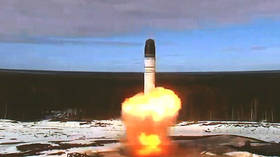Pentagon outlines position on Russian missile test

Russia’s launch of the new RS-28 Sarmat intercontinental ballistic missile (ICBM) was a routine test and not a threat to the US, the Pentagon told reporters. It also did not come as a surprise, since Moscow notified the US in advance under the terms of the still-existing arms control treaty.
“Russia properly notified the US under its New Start treaty obligations that it planned to test this ICBM,” Pentagon spokesman John Kirby told reporters on Wednesday afternoon, adding that the test was routine, and the US Defense Department deemed it “not a threat.”
The new missile was launched from the Plesetsk military cosmodrome on Wednesday morning, with Russian President Vladimir Putin calling it an “event of great significance” for the country.
“This truly unique weapon will strengthen the potential of our armed forces, reliably ensure the security of Russia from external threats and give pause to those who try to threaten us in the heat of frenzied aggressive rhetoric,” Putin said.
The new missile is able to penetrate all modern defenses, and will have no analog anywhere in the world for a long time, the Russian president added.
The test missile launched from Plesetsk and flew across the entire length of Russia, before touching down in the designated target area on the Kamchatka peninsula in the far east. The “Sarmat” is expected to complete trials by the end of this year, at which point it will officially enter service with Russia’s strategic missile forces.
Intended to replace the existing R-36 “Voevoda” silo-based ICBMs, the “Sarmat” can carry more weapons and can be fitted with the new hypersonic glider warheads, the Russian Defense Ministry said in a statement about the launch.













